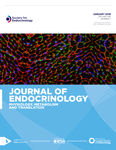MCT8 expression in human fetal cerebral cortex is reduced in severe intrauterine growth restriction
- Shiao Y Chan1⇑,
- Laura A Hancox1,
- Azucena Martín-Santos1,
- Laurence S Loubière1,
- Merlin N M Walter1,
- Ana-Maria González1,
- Phillip M Cox2,
- Ann Logan1,
- Christopher J McCabe1,
- Jayne A Franklyn1 and
- Mark D Kilby1,3
- 1School of Clinical and Experimental Medicine, College of Medical and Dental Sciences, University of Birmingham, Edgbaston, Birmingham B15 2TT, UK
2Department of Pathology
3Fetal Medicine Centre, Birmingham Women's NHS Foundation Trust, Edgbaston, Birmingham B15 2TG, UK
- Correspondence should be addressed to S Y Chan; Email: s.chan{at}bham.ac.uk
Abstract
The importance of the thyroid hormone (TH) transporter, monocarboxylate transporter 8 (MCT8), to human neurodevelopment is highlighted by findings of severe global neurological impairment in subjects with MCT8 (SLC16A2) mutations. Intrauterine growth restriction (IUGR), usually due to uteroplacental failure, is associated with milder neurodevelopmental deficits, which have been partly attributed to dysregulated TH action in utero secondary to reduced circulating fetal TH concentrations and decreased cerebral thyroid hormone receptor expression. We postulate that altered MCT8 expression is implicated in this pathophysiology; therefore, in this study, we sought to quantify changes in cortical MCT8 expression with IUGR. First, MCT8 immunohistochemistry was performed on occipital and parietal cerebral cortex sections obtained from appropriately grown for gestational age (AGA) human fetuses between 19 weeks of gestation and term. Secondly, MCT8 immunostaining in the occipital cortex of stillborn IUGR human fetuses at 24–28 weeks of gestation was objectively compared with that in the occipital cortex of gestationally matched AGA fetuses. Fetuses demonstrated widespread MCT8 expression in neurons within the cortical plate and subplate, in the ventricular and subventricular zones, in the epithelium of the choroid plexus and ependyma, and in microvessel wall. When complicated by IUGR, fetuses showed a significant fivefold reduction in the percentage area of cortical plate immunostained for MCT8 compared with AGA fetuses (P<0.05), but there was no significant difference in the proportion of subplate microvessels immunostained. Cortical MCT8 expression was negatively correlated with the severity of IUGR indicated by the brain:liver weight ratios (r2=0.28; P<0.05) at post-mortem. Our results support the hypothesis that a reduction in MCT8 expression in the IUGR fetal brain could further compromise TH-dependent brain development.
- Received in final form 31 October 2013
- Accepted 7 November 2013
- Made available online as an Accepted Preprint 7 November 2013
- © 2014 The authors
 This work is licensed under a Creative Commons Attribution 3.0 Unported License
This work is licensed under a Creative Commons Attribution 3.0 Unported License











